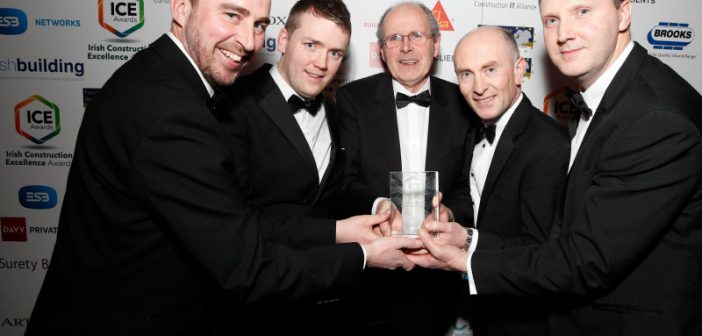Mark Costello, RPS Director of BIM talks about developing BIM capability in RPS – from successful collaboration with academia and staff education, to project implementation, awards and accreditations.
In recent years, RPS has increased its market share in the UK, particularly on large scale infrastructural projects. With the UK Government’s requirement for new collaborative working and 3D BIM on all projects by 2016, RPS recognised the need to develop its systems, design process and its people.
“Despite introducing ‘Early BIM’ into our working systems in 2007, limited advancements had been made. We had mostly delivered projects where BIM was not part of the design process. On this basis, we committed to developing the skills and expertise required to make us market leaders in BIM,” Mark recalls.
“We established a BIM Working Group to build on the systems already in place, and to track and document our progress. We restructured and built BIM capability in our core personnel, progressively adapting to change. In parallel with these initiatives, we contacted local academic institutions to seek out suitable training courses to enable upskilling. When such a course wasn’t available, we embarked on a journey to develop a BIM programme with the Galway Mayo Institute of Technology (GMIT) in specifically designed and relevant modules to support evolving technologies in a parallel BIM design process,” he adds.
Delivery of this training commenced on a pilot basis in September 2013 and it has culminated in the multi-award winning (industry/academia collaboration) and formally accredited Higher Diploma in Engineering in Building Information Modelling (Level 8) delivered by GMIT. This course, which is now open to the wider industry, was recently awarded the 2018 ICE Award for Third Level Course – Postgraduate, Special Purpose or Distance Learning.
Award-Winning Education
The Higher Diploma in Engineering in BIM is a flexible industry-focused programme that uses a combination of delivery modes including: traditional full-time or part-time attendance in GMIT and an outreach educational initiative, which takes place ‘in-house’ with the industry participants.
All modes use a blended learning pedagogical approach supported by the GMIT Virtual Learning Environment (VLE), Moodle. Each participant must complete three mandatory modules (BIM Virtual Modelling Fundamental, BIM Collaboration, BIM Project) and one elective from the four other modules on offer (BIM Architecture, BIM Infrastructure, BIM Structure, BIM Mechanical, Electrical and Plumbing). Each module is also available as an individual minor award.
The current programme has developed from the initial outreach pilot programme with eight Galway-based RPS staff training ‘in-house’ over a 12-week period. This led to a more extensive outreach pilot programme with over 100 participants across RPS Galway, Cork and Dublin offices. These pilots led to the Higher Diploma in Engineering in BIM being offered in full-time and part-time modes to the wider industry from September 2015.
The course has won a number of industry awards and has been well received by industry participants.
As well as the recent ICE Award, the GMIT / RPS Higher Diploma in Engineering in BIM won the Disciplinary Excellence in Learning, Teaching and Assessment Award (DELTA Award) in the Engineering / Construction category, the Excellence in Education and Training Award at the HR Leadership & Management Awards 2018, and the Excellence in Education and Training Award at the Irish Construction Industry Awards 2017.
Business Systems Certification
As well as upskilling staff with this award-winning BIM training, it was important for RPS to have its business systems certified in recognition of its ability to deliver projects in a BIM Level 2 environment for its clients.
“Our Galway office was initially awarded BIM Level 2 Business Systems Certification by BRE Global in November 2015. This accreditation was extended to our Dublin and Cork offices in May this year following a successful audit process. It was a huge achievement for RPS to have demonstrated to BRE Global that we have the systems and expertise across our Irish offices to design major building and infrastructure projects in Level 2 BIM for our wide range of clients,” says Mark.
“In summary, updating our digital technology skills is a continuous journey, but we have already met our accreditation targets which now allow us to compete in very competitive markets across varied project portfolios,” he concludes.
The content of this site is subject to copyright laws and may not be reproduced in any form without the prior consent of the publishers. The views expressed in articles do not necessarily represent those of the publishers.





